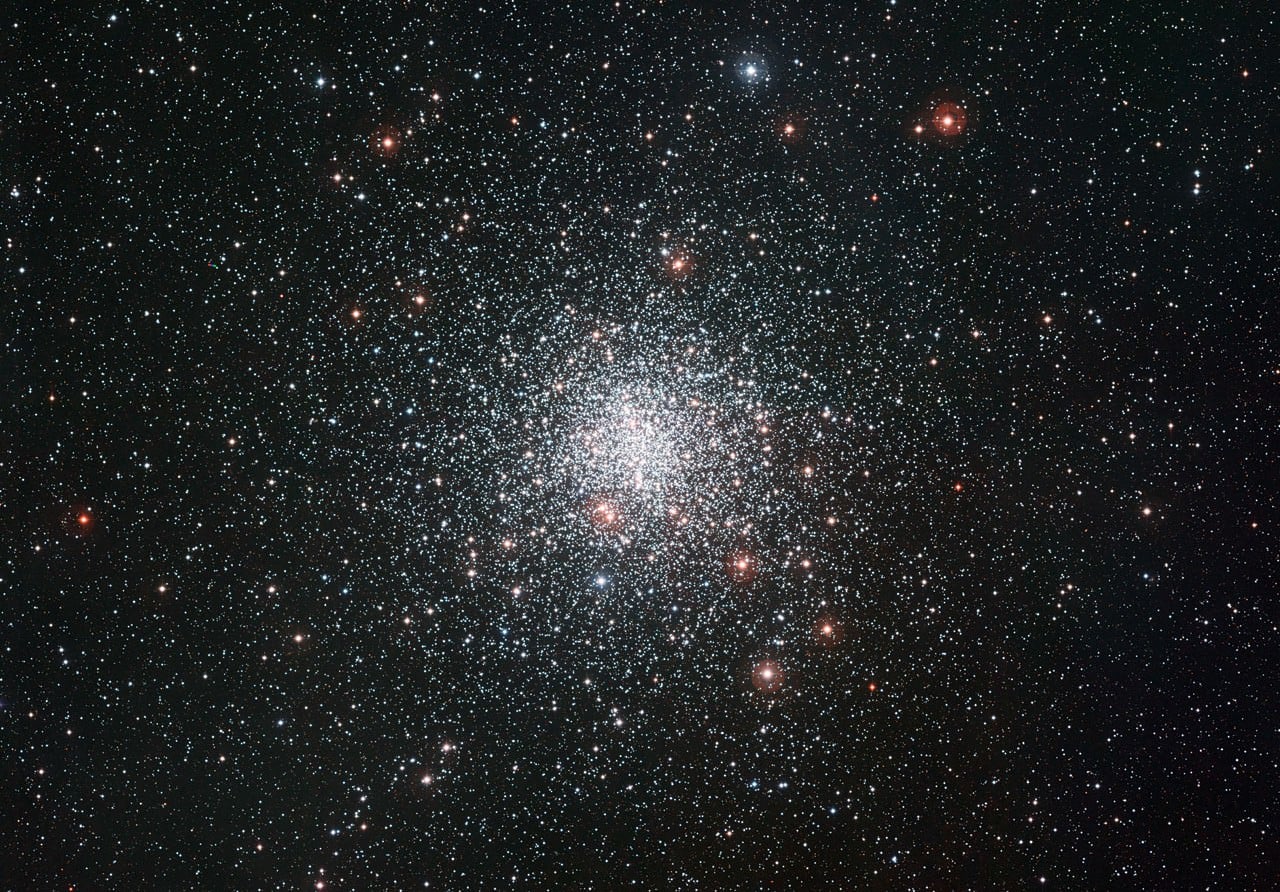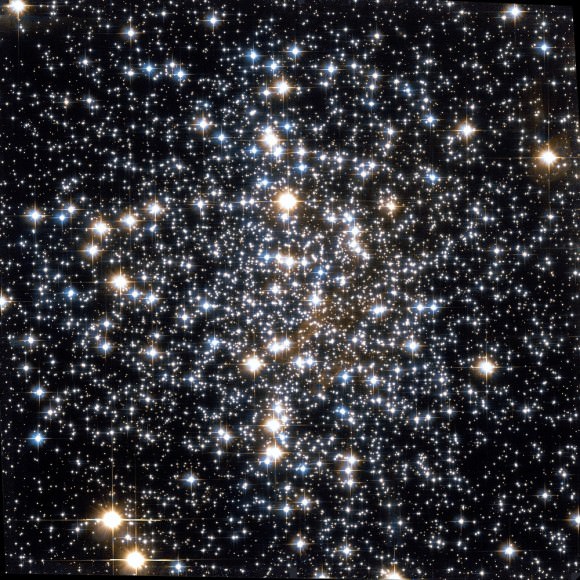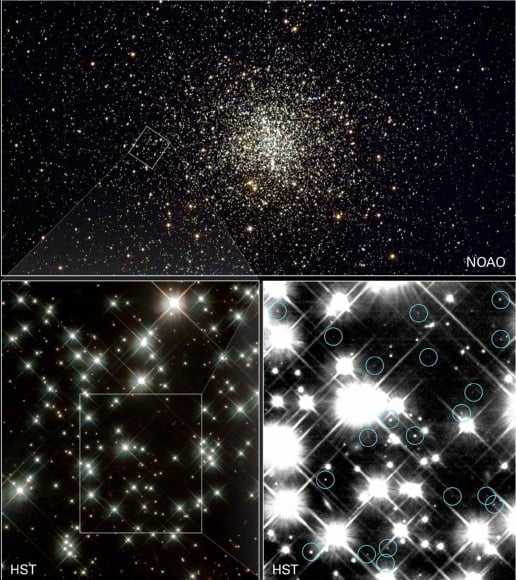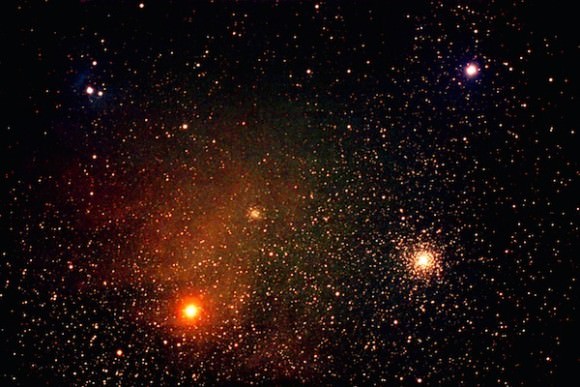During the late 18th century, Charles Messier began to notice that a series of "nebulous" objects in the night sky that he originally mistook for comets. In time, he would notice that they were in fact something significantly different. With the hope of preventing other astronomers from making the same mistake, he began compiling a list of these in what would come to be known as the
Messier Catalo
g.
Consisting of 100 objects, the catalog became an important milestone in both astronomy and the research of Deep Sky objects. Among the many famous objects in this catalog is the M4 loose globular cluster (aka. NGC 6121). Located in the Scorpius (Scorpio) Constellation, this great cluster of ancient stars is one of the closest Messier Objects of its kind to Earth.
Description:
M4 is one of the most open, or loosely constructed of globular clusters, as its high-classification of IX indicates (the higher the number, the less dense the cluster). Its central mass measures about 8 light years in diameter, but its full reach is 75 light years across. On top of that, its gravitational influence stretches for about 140 light years.
At a distance of about 7,200 light-years from Earth, M4 is also one of the closest Messier Objects to Earth (the other being
NGC 6397
/Caldwell 88). Based on abundance readings, it is believed that the cluster is home to two distinct classes of stars, which could indicate that M4 underwent two separate cycles of stellar formation.
[caption id="attachment_127513" align="aligncenter" width="580"]
Image of the Messier 4 globular cluster, taken by Hubble Space Telescope. Credit: NASA, STScI, WikiSky
[/caption]
M4 follows an orbital path that takes it through the Milky Way with a period of
116 ± 3 million years
. When passing through the disk, this cluster passes the center of our galaxy at a distances of less than 5000 parsecs. This causes it to undergo tidal shock (a gravitational perturbation) each time it passes through, which can cause the repeated shedding of stars. Thus, the M4 cluster may currently be much smaller than it was in the past.
The globular cluster is home to at least 43 known variable stars and to the first millisecond pulsar ever discovered inside a globular cluster. This neutron star - known as - is rotating (and pulsating) once every 3.0 milliseconds, or over 300 times per second. This about ten times faster than the
Crab Pulsar
, perhaps the most famous pulsar discovered.
Between 1995 and 2001
, the National Optical Astronomy Observatory (NOAO) and NASA also uncovered the oldest burned-out stars in our Milky Way Galaxy within this cluster. These small, burned-out stars - called white dwarfs - are about 12 to 13 billion years old, which has given astronomers a fresh reading on the age of the universe.
By adding the one billion years it took the cluster to form after the Big Bang, astronomers deduced that the age of the white dwarfs concurs with previous estimates of the universe being between 13 and 14 billion years old. Observations of the full cluster were performed by the Kitt Peak National Observatory's in March 1995.
[caption id="attachment_127514" align="aligncenter" width="516"]
The M4 cluster (top) with sections showing white dwarf stars shown in the bottom left and right. The blue circles indicate the dwarfs. Credit: NASA/JPL/NOAO/HST
[/caption]
Subsequent examinations of a small region of the cluster (measuring only a light-year across) were performed by the HST's Wide Field and Planetary Camera 2 between January and April of 2001. These images revealed the presence of cool, aging white dwarf stars, which are circled in the image above (bottom right).
Another interesting find was the binary star system which consists of a white dwarf and a pulsar companion (PSR B1620-26). This star also has a confirmed exoplanet, one which has 2.5 times the mass of Jupiter - making it a "
Super Jupiter
".
History of Observation:
Messier 4 was originally discovered by Philippe Loys de Chéseaux in 1746-46, and listed by him as Number 19 in his catalog. As he recorded of the object when first seeing it: "One which is near Antares, which I have found, for this year, at RA 242d 1' 45" and declination 25d 23' 30". It is white, round and smaller than the previous ones; I don't know anyone who noted it previously." It was also included in Nicholas Lacaille's catalog as Lacaille I.9. Said he of the object: "It resembles a small nucleus of a faint comet. [1763] Observed on April 13, 1752."
It was Charles Messier who first resolved the object into individuals stars. And M4 was the first globular cluster where individual stars were resolved. When he cataloged it on May 8th, 1764, he recorded in his notes: "On May 8, 1764, I have discovered a nebula near Antares, and on its parallel, it is a light which has little extension, which is faint, and which is difficult to be seen: when employing a good telescope for viewing it, one can perceive very small stars. Its right ascension has been determined at 242d 16' 56", and its declination as 25d 55' 40" south."
[caption id="attachment_127520" align="aligncenter" width="457"]
The Scorpius Constellation, showing M4 in close proximity to Antares. Credit: IAU.org
[/caption]
But again, it was English astronomer and naval officer Admiral Smyth that described it most eloquently:
Dominique François Jean Arago, a French astronomer who lived from the late 18th to the mid-19th century, had this to say about M4:
[caption id="attachment_127518" align="aligncenter" width="580"]
Red star Antares, right, and nearby star cluster M4. Credit: StargazerBob.com
[/caption]
Locating Messier 4:
Finding Messier Object 4 is quite easy, given its apparent luminosity and proximity to Earth. Even with the naked eye, all one needs to do is locate the red star Antares (Alpha Scorpii, aka. "the rival of Mars"), and you'll M4 located 1.3 degrees away to the west. Even the slightest optical aid (like binoculars) will reveal this magnificent globular cluster with ease on a dark night, provided that light pollution is not a significant factor.
With favorable conditions, telescopes as small as 3" will begin resolving this huge ball of stars. With a large enough aperture, all one needs to do is look for the central "bar" structure in M4, which was first noted by William Herschel in 1783.
For your convenience, here are the quick-facts about Messier 4:
- Object Name
-
Messier 4
- Alternative Designations
-
NGC 6121
- Object Type
-
Class IX Globular Cluster
- Constellation
-
Scorpius
- Right Ascension
-
16 : 23.6 (h:m)
- Declination
-
-26 : 32 (deg:m)
- Distance
-
7.2 (kly)
- Visual Brightness
-
5.6 (mag)
- Apparent Dimension
-
36.0 (arc min)
Good luck seeking out this globular cluster, and may your view of it be clear and beautiful!
We have written many interesting articles about Messier Objects here at Universe Today. For instance, here's Tammy Plotner's
Introduction to the Messier Objects
,
M1 – The Crab Nebula
, and David Dickison's articles on the
2013
and
2014
Messier Marathons.
Be to sure to check out our complete
Messier Catalog
.
For more information, check out the
SEDS Messier Database
.
 Universe Today
Universe Today




